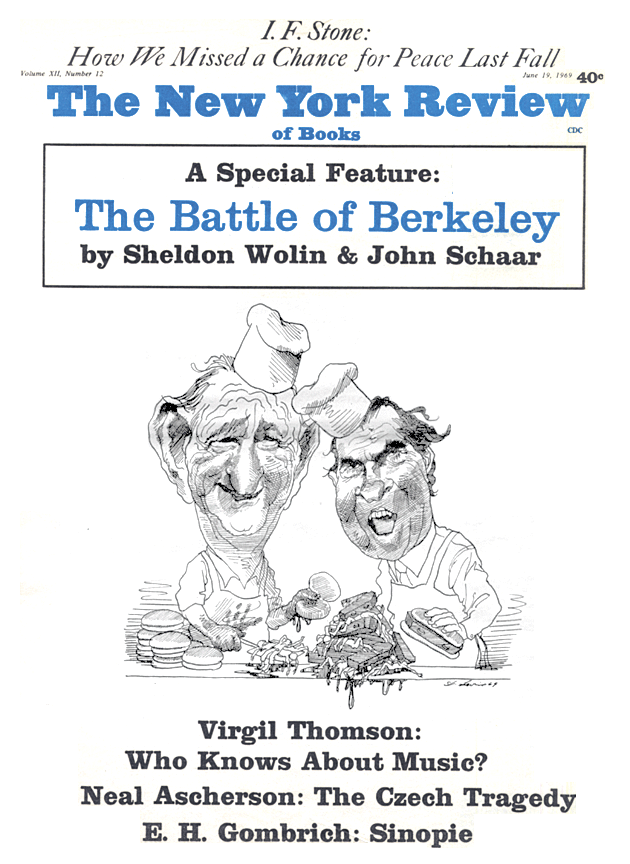In response to:
A Special Supplement: Reflections on Violence from the February 27, 1969 issue
To the Editors:
Miss Hannah Arendt quotes me as saying “Violence is sometimes needed for the voice of moderation to be heard.” The actual statement was: “Violence is the only way of ensuring a hearing for moderation” and the author was the nineteenth-century Irish agrarian and nationalist agitator, William O’Brien. Miss Arendt heard me quote the remark during a symposium on violence in which we took part, and the confusion of the two O’Briens is of course quite natural in the circumstances.
The point is of no great importance but as William O’Brien’s maxim is both crisper and stronger than the one attributed to me, it may be as well to put it on record here, with the proper attribution.
Conor Cruise O’Brien
New York City
Hannah Arendt replies:
- Nathan Glazer complains that I have misrepresented his position. His letter convinces me that I did not. The fact that rebellious students (like the rest of us) profit from standards of living made possible through modern technology is not an argument against their antitechnological attitude. They hardly could do otherwise and still stay alive. It is as though one were to reproach Marx for living on the earnings of Engels, which certainly depended on the capitalist economy, exploitation, and the rest.
I still find it strange that Glazer sees no distinction between nineteenth- and twentieth-century machinery. To be sure, there was always an interplay between warfare and general technological development, not just during the nineteenth century but throughout the centuries. But the emphasis in the twentieth century, that is with the rise of the atomic age, has shifted decisively from production to destruction. It is simply not true that “the catastrophic capacities for destruction of contemporary machines can be controlled…through other machines.” Since the stage of overkill has been reached, such hopes are rather absurd. Mr. Glazer qualifies his machines; they may be technological or organizational. To think about “organizational machines” is the hallmark of the technocratic mentality.
- In a way, Mr. Abelson is right. The essay on violence meant to clarify certain issues. In Mr. Abelson’s language, presumably the language of an activist—who should not be confused with the man of action—this turns into “merely” [sic] championing the cause of intellectual clarity.” I didn’t champion a cause—I could have done so only by writing an essay on intellectual clarity, which I didn’t do. Mr. Abelson doesn’t think highly of “merely” clarifying issues without championing anything, and he clearly is outraged when “burning political questions” are subjected to such treatment. Also, he doesn’t believe that such treatment can be explained except by assuming sinister ulterior motives.
Mr. Abelson’s own attitude toward clarity comes to light immediately. He suspects that I identify power with authority on the strength of a sentence which says explicitly the opposite. He quotes me, correctly, as deploring that political science “does not distinguish between such key terms as power,…authority, and violence.” How could I deplore this if I identified them? He goes on to complain that I did not explain the differences between power, strength, force, and said nothing further about authority. I gave the explanation myself, but he ignores it. Perhaps it would have helped if in this abbreviated version one sentence had been left in which the editors took out because they thought it superfluous. (It reads as follows: “In such a situation [of confusion] it is always tempting to introduce new definitions, but I am afraid this would not help; the definitions would lack in plausibility” for reasons which are then enumerated in the text.) But I doubt this would have been helpful. For although Mr. Abelson had obvious difficulties in understanding what I said, his conclusions—I “bless the establishment” and deliberately overlook the violence committed by “respectable governments”—are so out of tune with everything I wrote that I can only conclude that he either never read the article or had decided upon my sinister plans regardless of what I was saying.
The trouble with Mr. Abelson is that he does not believe in distinctions. For him, the important difference between violence and power is a “difference in moral implication,” and, in view of the enormous role violence as well as power played in the record of human affairs, whoever wishes to know what we are dealing with is told that the “function” of the term “violence” is “to label actions as wrong.” This reply is question-begging to the point of ridicule. If I wish to know what justice is, and then say: the “function” of the term “justice” is to label actions as right, the next question that comes to mind is: what is it in “justice” that enables it to serve this function? I am back where I started from.
Clearly, it is useless to argue unless some commitment to intellectual clarification exists on either side, just as it is futile to respond when confronted by bad faith.
- I thank Mr. O’Brien for his correction. When I heard him I was indeed not aware that he was quoting.
This Issue
June 19, 1969


